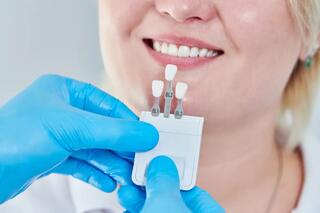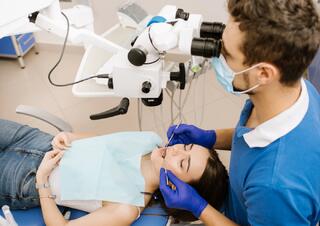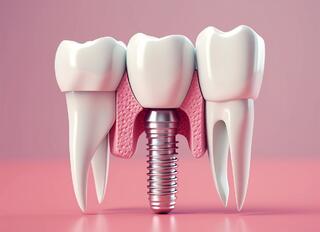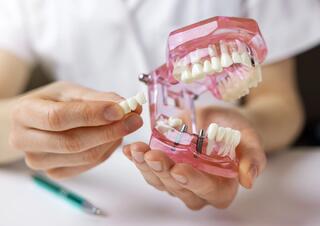Preparing for dental implantation is a crucial step in ensuring the success of the procedure. In this article, we’ll go over all the important stages—from the initial consultation to the final tests. You’ll learn how the dentist identifies contraindications, prepares the jaw for implantation, and which medications might be necessary. We’ll also discuss the importance of CT scans, modeling, and bone grafting. We’ll provide detailed tips on how to prepare for surgery on the day of implantation, including advice on nutrition and emotional readiness. By following these recommendations, you’ll minimize risks and set yourself up for a successful outcome.
Pre-implantation Preparation Process
This stage involves diagnosis, examination, and treatment planning and lasts 1 to 6 weeks. During this time, the dentist identifies any possible contraindications, creates an implantation plan, and reduces the risks of complications.
In a reputable clinic, the patient is usually assigned a dentist, implantologist, and prosthodontist. These specialists will explain how to ease the preparation process, answer any questions, and provide immediate assistance if any issues arise.
Although the implantation procedure itself is quick, the specialist must be thoroughly prepared for surgery to minimize the risk of errors. Every step needs to be precise, and the risk of complications should be kept to a minimum. A detailed pre-implantation evaluation, even if it's done on short notice, can take 1-2 weeks.
You should also purchase pain relievers in advance to take before the surgery. This will help prevent intense pain once the anesthesia wears off. Additionally, you can prepare soft foods and cold compresses ahead of time to make the recovery period easier and more comfortable.
Initial Consultation
During the initial consultation, the doctor will gather your medical history by asking about your overall health. It’s important for the specialist to know how long the tooth has been missing and whether there are any absolute or relative contraindications, chronic diseases, or medications you are currently taking.
After collecting your medical history, the specialist will examine your oral cavity, assessing the condition of your gums, enamel, and tongue, as well as the function of the temporomandibular joint, tooth alignment, and bite. Additional tests may be prescribed as needed.
Required Tests
To reduce the risk of complications, the doctor will order several tests before the implantation procedure:
- Complete Blood Count (CBC) with a detailed white blood cell count. This helps identify anemia or any viral or infectious diseases that could weaken the immune system.
- Biochemical Blood Test (BCH). This detects inflammation in internal organs or metabolic disorders, which could slow down recovery after implant placement.
- Blood sugar test. Blood sugar levels should be below 8-10 mmol/L. Higher sugar levels can reduce blood clotting and slow down healing.
- Tests for HIV, hepatitis C and B, and syphilis. These conditions, if active, can lead to complications during and after the procedure.
CT Scan
A CT scan or panoramic X-ray provides a 3D image of the jaw structure. It allows the specialist to assess the quality and condition of the jawbone, identify areas of bone loss, the position of the remaining tooth roots, the size and location of the sinus cavities, the trigeminal nerve, and any impacted (unerupted) teeth.
This scan is essential for determining the exact placement point of the implant and its angle. If there is insufficient bone volume, the doctor may recommend bone grafting. At our "Biodent" clinic, we perform the CT scan during the initial dental consultation using our in-house equipment.
Modeling
After the diagnosis, the specialist uploads the panoramic image of the jaw into a computer. Based on the CT scan and the evaluation of the temporomandibular joint (TMJ), the specialist creates a 3D model. This model helps pinpoint the implant placement locations and design the prosthetic structures (crowns or bridges). The angle of the implant is also calculated to avoid damaging the neighboring tooth roots, sinuses, or the trigeminal nerve.
Using this model, the specialist creates a surgical guide—a silicone splint with slots for implant placement, ensuring precision down to fractions of a millimeter.
Oral Sanitation
Before placing implants, the dentist performs a professional cleaning of the remaining teeth and treats any existing inflammation. This process includes:
- Removing plaque and tartar
- Cleaning under the gumline
- Treating any gum or tooth diseases
If the patient has had previous implants, the doctor will also inspect them to assess the condition of the prosthetics and the tissue around the implants.
Bone Grafting
After tooth loss, the bone tissue begins to deteriorate. If there is not enough bone for implant placement, the dentist performs bone grafting. This may be done at the same time as the placement of the titanium post if bone loss is minimal, or as a separate procedure if a significant amount of bone has been lost. In the latter case, the bone graft will take 4-6 months to integrate, and only then can the implant be placed.
The method of bone grafting depends on the clinical situation:
- Upper jaw atrophy: The implant surgeon performs a sinus lift, raising the floor of the sinus cavity to increase the height of the bone.
- Lower jaw atrophy: The doctor increases bone volume using bone chips, granules, or a bone block graft, depending on the extent of the bone loss.
Medication Prescription
The implantologist may prescribe or recommend medications before implant placement. The type of medication depends on the patient’s condition:
- Antibiotics: These are prescribed if there is a risk of complications, such as in cases of poor oral hygiene, weakened immune systems, or gum disease. The risk of complications also increases when multiple implants (3-6) are placed at once.
- Medications prescribed by the patient’s specialist: If the patient has chronic conditions, they should consult their doctor. For example, a cardiologist may recommend medications to lower blood pressure to minimize the risk of bleeding during surgery.
Patients should not stop taking their regular medications or start new ones without the implantologist’s approval.
After a dental cleaning, it's crucial for the patient to maintain good oral hygiene by brushing thoroughly, flossing, and using an antiseptic mouthwash. Any decaying or severely damaged teeth need to be removed, as they can compromise the overall hygiene of the mouth and increase the risk of harmful bacteria entering the surgical area.
The condition of your teeth and the need for extractions are evaluated by the dentist after a diagnostic assessment. Even seemingly healthy teeth can be damaged internally or at the root.
What Should You Avoid Before Implantation?
-
Avoid taking anticoagulants.
Blood-thinning medications can cause severe bleeding during or after implant placement. -
Avoid smoking and alcohol.
Hot smoke irritates the mucous membrane and slows down healing after implantation. Alcohol increases blood pressure, which can lead to bleeding. -
Avoid stress.
Stress may trigger a return to bad habits such as smoking or alcohol and can also raise blood pressure, potentially leading to bleeding. -
Avoid physical exertion and overheating.
These activities raise your heart rate and blood pressure, increasing the risk of bleeding. -
Avoid vaccinations.
After vaccinations, the immune system is under extra strain, which could increase the risk of inflammation.
What Should You Do on the Day of Surgery?
-
Brush your teeth thoroughly.
Clean the enamel and the soft tissues from plaque. For better results, use floss, an irrigator, or an antiseptic mouthwash. -
Limit breakfast.
If the procedure is scheduled for the morning, it's better to drink water or weak tea instead of having breakfast. If it's in the afternoon, opt for a light meal (such as cottage cheese, scrambled eggs, or a salad). -
Wear comfortable clothing.
Loose clothing won’t restrict your movements during the surgery. Bring a sweater in case it gets cold or remove layers if it gets warm. -
Avoid makeup and jewelry.
Lipstick can contaminate the surgical area or instruments. Eye makeup may smudge during the procedure. Jewelry can interfere with the dentist or assistant during surgery. -
Take a pain reliever.
This will help prevent severe pain once the anesthesia wears off. -
Prepare food in advance.
After the procedure, it’s best to head home and rest. Soft foods like purees or baby food should be prepared before the surgery. -
Charge your phone.
Anesthesia typically lasts 4-5 hours, during which time you may feel disoriented. Call a friend or family member in advance for assistance, and consider taking a taxi, as it's not advisable to use public transport after surgery.
Frequently Asked Questions
What gum diseases or infections need to be treated before implantation?
It’s important to minimize all inflammatory processes in the mouth. This includes treating cavities and pulpitis, as well as gum diseases such as gingivitis, periodontitis, periodontal disease, periapical periodontitis, and periostitis.
Is a special diet required to aid healing after implantation?
Yes, it's best to avoid fatty, fried, salty, or sugary foods, as well as strong tea and coffee. These foods contribute to the rapid buildup of plaque and the growth of harmful bacteria.
Do I need approval from my primary care physician before surgery?
Yes. During your first consultation, inform your dentist about any chronic conditions. They may refer you to a specialist. While it's unlikely that surgery will be denied, your physician (cardiologist, endocrinologist, or general practitioner) may prescribe additional medications to prevent complications during implantation.
How can I emotionally prepare for implant placement?
Let your implantologist know in advance if you’re feeling anxious. The specialist can prescribe a mild sedative to reduce stress. Try not to dwell on negative outcomes—at Biodent, the implantation procedure is painless and free of discomfort. You can also prepare by finding interesting movies or creating a playlist of your favorite music to help you relax after the procedure.









